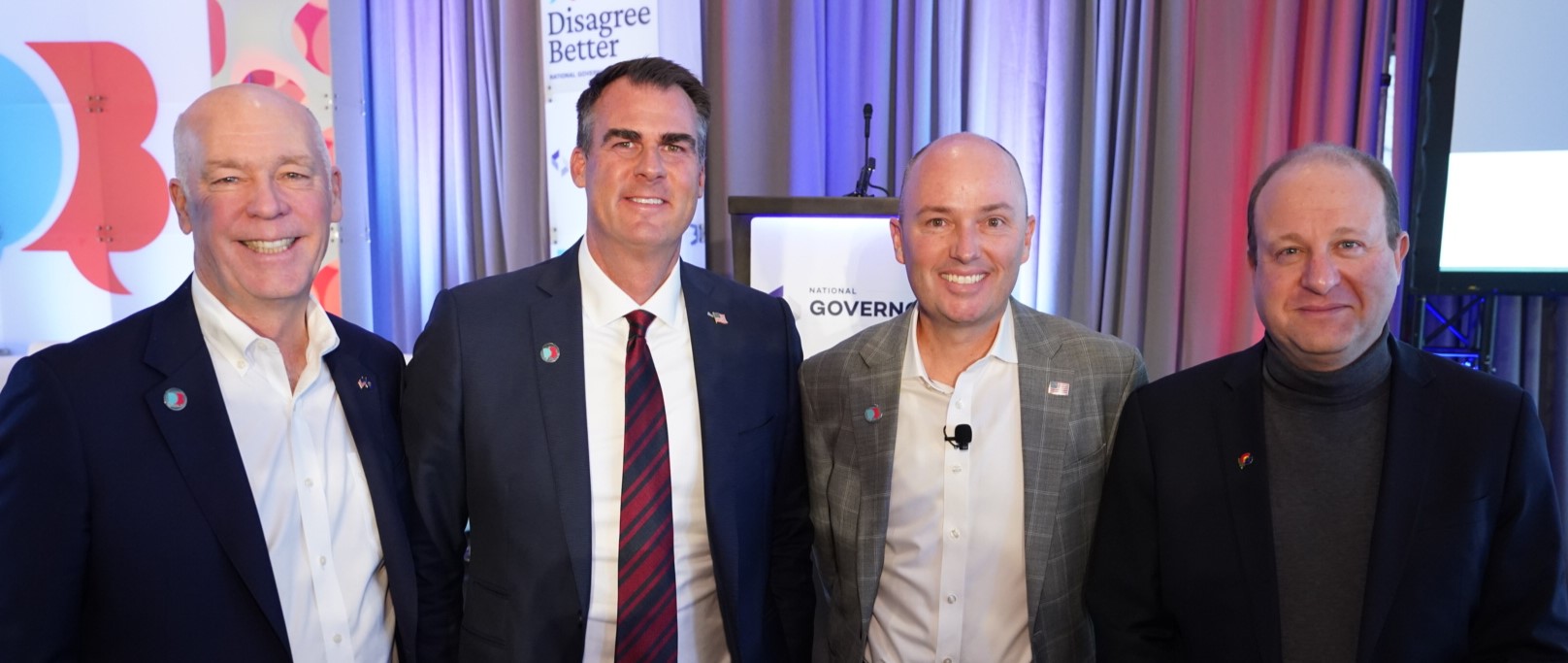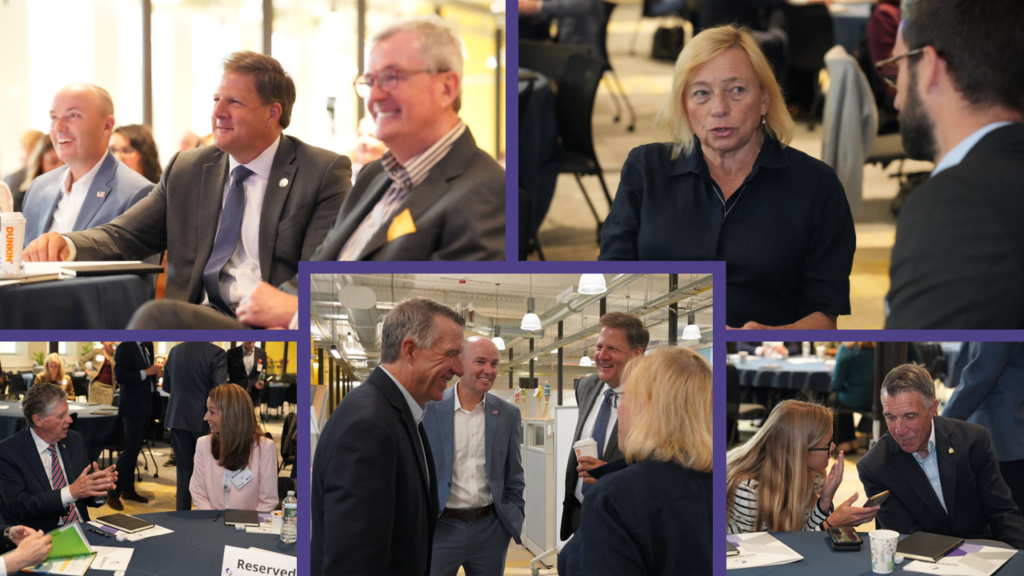

2023-2024 NGA Chair’s Initiative
Disagree Better
Americans are deeply concerned and exhausted by the hyperpartisanship and polarization in our country, and rightly so. We’ve forgotten how to persuade without hating each other. But our nation’s history shows there’s a better way, and we all need to re-learn how to Disagree Better.
Addressing America’s Polarization Problem

In a special double issue, Deseret Magazine assembled preeminent thinkers actively seeking to address America’s polarization problem.
The takeaway: “There is a path out of the perpetual game of chicken. It won’t be easy, but it starts with each American. It starts with more constructive dialogue, better disagreeing, more listening and understanding, and individual decisions to treat our political opponents with greater dignity and trust, or, in the words of Wood, like they’re family.”
Articles include:
Disagreeing Better In Colorado
NGA Chair Utah Governor Spencer Cox and NGA Vice Chair Colorado Governor Jared Polis hosted the second in a series of bipartisan events in support of Governor Cox’s Disagree Better Initiative in Denver, Colorado on November 14, 2023.
Centered on the theme of teaching youth about healthy conflict and fostering open debate and free expression in higher education, the event featured panel discussions with bipartisan experts; a practical application of those topics through a service project; and a debate facilitated by Braver Angels, a nonprofit dedicated to political depolarization.
Session Readouts & Videos
- Disagree Better Panelists Highlight Ways To Teach Students Of All Ages About Healthy Conflict And Free Expression
- Disagree Better Speakers Explore The Question: What Do Universities Owe Democracy?
- Video: Fireside Chat with Governor Spencer Cox and John Tomasi
- Video: Teaching Youth about Healthy Conflict
- Video: Fostering Open Debate, Free Expression & Viewpoint Diversity in Higher Ed
- Video: Keynote Address by Keith Allred
Disagree Better: Healthy Conflict for Better Policy
Americans need to disagree better. And by that we don’t mean that we need to be nicer to each other, although that’s helpful. We need to learn to disagree in a way that allows us to find solutions and solve problems instead of endlessly bickering.
The “exhausted majority” of Americans want this, and the science is clear about interventions that reduce polarization. As doers and builders, Governors are in a unique position to model what healthy conflict looks like.
The Disagree Better initiative will look at the problems of polarization, elevate the solutions that groups around the country are already implementing, and feature Governors showing what disagreeing better looks like. Through public debates, service projects, public service announcements and a variety of other tactics, Americans will see a more positive and optimistic way of working through our problems.
We’re also going to put these principles to work on a real-world policy challenge that needs resolution: the longtime stalemate over immigration. In collaboration with the business community and other stakeholders, our hope is to find enough consensus among Governors to identify common principles around immigration policy.
We know that conflict resolution takes work and involves difficult conversations. It’s much easier to sow division than to persuade or find solutions. But we also know that no one ever changed someone’s mind by attacking them.
Through healthy conflict, we’re confident that we can find common ground and improve our families, our communities and our nation. Together, we can disagree better.
– Utah Governor Spencer Cox, NGA Chair
In the News
- Pew: Beyond Polarization: Finding a Way Forward
- Common Ground Committee: Disagree Better: Politics Across Divides with Utah Governor Spencer Cox
- AJC Advocacy Anywhere: Disagree Better Uniting Against Hate and Polarization
- CBS: Utah Gov. Spencer Cox and Colorado Gov. Jared Polis on “Face the Nation”
- University of Denver: University of Denver Students Learn to Disagree Better
- The Dallas Morning News: Utah Governor: let’s disagree better at our Thanksgiving tables
- The Denver Gazette: Governors on a crusade to get Americans to ‘disagree better’
- Colorado Public Radio: Interview: Jared Polis joins Utah’s governor to talk civility in politics, even with contentious state issues
- Additional coverage…
Disagreeing Better in New Hampshire
On September 12, 2023, National Governors Association Chair Utah Governor Spencer Cox and New Hampshire Governor Chris Sununu welcomed Governors, national experts and students to Manchester, New Hampshire for the first in a series of bipartisan events to help address toxic polarization in America – the aim of Governor Cox’s 2023-24 NGA Chair’s Initiative: Disagree Better. The bipartisan event was also attended by Maine Governor Janet Mills, New Jersey Governor Phil Murphy, Rhode Island Governor Dan McKee and Vermont Governor Phil Scott.
Centered on the theme of Correcting Misperceptions and Highlighting Commonalities, the event featured panel discussions with bipartisan experts leading nationwide efforts to reduce partisan animosity and foster healthy conflict; a debate facilitated by Braver Angels, a nonprofit dedicated to political depolarization; and a service project, “Show Up for Teachers.” Learn more about the Disagree Better initiative below.
Session Readouts

about the Initiative

Disagree Better is an effort to show that as Americans, we can work through our differences to find solutions to the most difficult problems facing our states and our nation. This effort includes a series of public-facing efforts, assisted by NGA and chosen from a toolkit of interventions that are customizable for each state/governor. These strategies include:
- Hosting a service project within your communities, potentially with your state Legislature and their spouses from both sides of the aisle.
- Recording an ad with a neighboring governor from a different party, a legislator from the opposing party, or a campaign opponent. NGA Chair Utah Gov. Cox, a Republican, and NGA Vice Chair Colorado Gov. Jared Polis, a Democrat, explain more in this video.
- Recording a brief civic education ad, explaining that our nation’s founding and the Constitution were designed for people from different backgrounds and with different views.
- Writing an op-ed with someone from the other party on a topic of common ground.
- Hosting a debate at a college or university that models healthy conflict to future generations, including in partnership with organizations like Braver Angels and Bridge USA.
DISAGREE BETTER: POLITICS ACROSS DIVIDES
Governor Spencer Cox joined the Let’s Find Common Ground podcast to talk about how Disagree Better is working to bring together red and blue governors, looking at the problems of polarization and elevating solutions. The Common Ground Committee invites citizens and leaders to shift their goal from winning arguments to making progress on issues, inspiring them to work toward a world where health, wealth and happiness can be achieved by all.
Over the next year, we’ll host four NGA convenings across the country to expose Governors to the good work already happening and connect them with the leading organizations, so they can help elevate and accelerate such work in their states.
The goal is for Governors to model how to disagree better, setting an example and creating the permission structure and template for other public officials at every level to follow.
Help America #DisagreeBetter
We all have a role to play in overcoming toxic polarization. While a big part of the Disagree Better initiative focuses on Governors working together toward a more positive way of solving our national challenges, you don’t have to be an elected official to make a difference in our political culture. We’re inviting other members of the “exhausted majority” – of all ages – to join us.
If you’re not sure how to participate, take a look at the ideas below. Drawing on a variety of resources, these action items comprise a toolkit that anyone can use to get started. A number of national organizations are tackling toxic polarization in a thoughtful way — fanning out in campuses and communities to engage Americans in constructive dialogue and service projects. You’ll find those opportunities and more below. From home to school to work to leisure time, we have strategies for every setting. There are plenty of ways to get involved and do your part to help America Disagree Better.
#DisagreeBetter At Home
Toxic polarization has moved beyond the political arena to impact our relationships with family, friends and neighbors. Even our hobbies are sources of conflict. Try these resources to navigate those crucial relationships and bring peace to the dinner table.
Find Inspiration
#DisagreeBetter in Your Community
Americas are losing faith in the institutions that used to bind us. From the classroom to the break room to the sanctuary, we need leaders to help guide the way back to common ground. Explore these opportunities to apply Disagree Better to promote harmony in these institutions that are so essential to American life.
Find Inspiration
take Action
#DisagreeBetter Politically
When policy discussions become more about scoring points than achieving progress, we all lose. These tools help empower elected officials and voters alike to elevate cooperation over conflict, and compromise over rhetorical combat.
Find Inspiration
Research and Resources on Healthy Conflict
Dozens of groups across the nation are involved in depolarization work, and the Disagree Better NGA Initiative will work to elevate their research and resources.
Here is a list of individual leaders and organizations we have relied on in developing Disagree Better:
the Power of Service
The research is clear that participating in service activities breaks down barriers, lifts up others and improves mental health. As part of the Disagree Better NGA Initiative, Utah First Lady Abby Cox will be leading efforts to incorporate a service project at each of the four NGA convenings throughout the year.
Academic Studies
Organizations
Organizations
- American Enterprise Institute
- American Council of Trustees and Alumni
- American Exchange Project
- Bipartisan Leadership Project
- Boncom
- Boston Debate League
- Brookings Institution
- Freedom House
- Heterodox Academy
- Hewlett Foundation
- Listen First Project
- Meeting of America
- Millennial Action Project
- Moral Courage
bridging the partisan divide
In a panel discussion held during the NGA Annual Meeting, Governor Cox invited leaders engaged in bridging the partisan divide to share their thoughts.

Moderator Mónica Guzmán, Senior Fellow for Public Practice at Braver Angels, kicked off the discussion by asking panelists to define the problem.
Tim Shriver, Chairman of Special Olympics International and the founder of Unite, identified the issue as “the erosion of trust” and “the rise of contempt as the problem-solving tool of choice.”
“We are kidding ourselves if we treat our opponent with contempt and claim to be about the people’s business,” Shriver continued. “We are no longer about the people’s business; we are no longer about solving problems. We are now about making points that aggrandize and feed our own addiction to safety and security but do nothing to solve the problems of the country.”
Yuval Levin, Director of Social, Cultural, and Constitutional Studies at the American Enterprise Institute, commented: “The problem is not that we’ve forgotten how to agree; the problem is we’ve forgotten how to disagree. The forgetfulness is created by a political culture that encourages us to see the various institutions that we’re all a part of … not as [forums] to get things done together but as platforms for ourselves as individuals.”
See a readout from the session, or watch the discussion below.